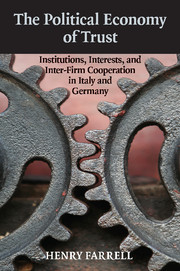 The Political Economy of Trust
The Political Economy of Trust Book contents
- Frontmatter
- Contents
- Acknowledgments
- 1 Introduction
- 2 A Theory of Institutions and Trust
- 3 Varieties of Capitalism and Industrial Districts
- 4 Trust and Institutions in Industrial Districts
- 5 Accounting for Change in Informal Institutions
- 6 Informal Institutions without Trust: Relations among Mafiosi in Sicily
- 7 Conclusions
- Bibliography
- Index
- Titles in the series
3 - Varieties of Capitalism and Industrial Districts
Published online by Cambridge University Press: 24 September 2009
- Frontmatter
- Contents
- Acknowledgments
- 1 Introduction
- 2 A Theory of Institutions and Trust
- 3 Varieties of Capitalism and Industrial Districts
- 4 Trust and Institutions in Industrial Districts
- 5 Accounting for Change in Informal Institutions
- 6 Informal Institutions without Trust: Relations among Mafiosi in Sicily
- 7 Conclusions
- Bibliography
- Index
- Titles in the series
Summary
INTRODUCTION
The previous chapter lays out a theory of the relationship between institutions and trust, showing how institutional variation is likely to be associated with variation in patterns of trust (and thus cooperation) and how institutional change over time will have knock-on consequences for trust. How is this relevant for the kinds of trust and cooperation that political scientists and other social scientists are interested in? There are many possible applications. The larger part of the remainder of this book takes up one of the more important ones, examining trust and cooperation in the context of comparative political economy and, more particularly, the literature on cooperation among firms.
Comparative political economy needs a proper theory of the relationship between institutions, trust, and cooperation. Over the last several years, scholars in this tradition have made some real theoretical advances. The “varieties of capitalism” literature (Shonfield 1969; Albert 1993; Hollingsworth, Schmitter, and Streeck 1994; Hollingsworth and Boyer 1997; Crouch and Streeck 1997; Hall and Soskice 2001) offers an account of how institutions matter to the economy and of how differences in institutions are likely to be associated with differences in both economic policy making and firm behavior. A recent and highly influential synthesis (Hall and Soskice 2001) seeks to apply rational choice arguments about institutions to the traditional concern of comparative political economy – explaining variation in the forms of coordination to be found in different economies.
This synthesis, while a major advance, is unlikely in its current form to provide a rigorous and complete account of the relationship between institutions and cooperation in the political economy. There are some important weaknesses in Hall and Soskice's microfoundations.
- Type
- Chapter
- Information
- The Political Economy of TrustInstitutions, Interests, and Inter-Firm Cooperation in Italy and Germany, pp. 63 - 94Publisher: Cambridge University PressPrint publication year: 2009
